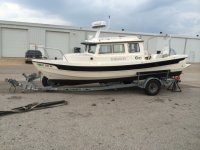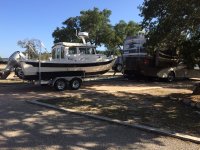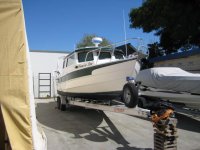I agree with Steve Baum, no matter what one says on this subject, there will be plenty of opposite thoughts. Since I live in Boise, I have a lot of experience with trailers. We have had boats for 30+ years, the last 2 being a C-Dory 22 and our current 16. We had the 22 for 11 years and made trips as far as Everett, WA, San Francisco Bay via Lake Tahoe, Yellowstone Lake, and Priest Lake, Id (1,000 miles round trip) all on an E-Z Loader single axle. We never had any trailer, tire or bearing issues with that setup. Here is my take on what made that work. First, work with a good dealer who knows the load requirements your craft will put on the trailer. He than recommends the right trailer and tires for your set up. He then assembles the trailer so that you have the correct tongue weight and the axle is positioned correctly. In our case we bought our boat from Sportcraft in Portland they did a good job. Next and this has been stated elsewhere, equally or more important, inspect your tires, especially the sidewall both inside out for any issues that might cause a blowout, and look for any tread damage, check the wheel bearings by jacking up the trailer looking for excessive play or grinding noise. Finally check cold tire pressures with an accurate gauge. I have a compressor and make sure my trailer tires are inflated to the psi stamped on the sidewall, and don't forget to check the spare. I do all this the week before we leave so if we have an issue, we have time to get it fixed. Obviously the 16 is a different animal but I still do all the checks and last year before we left for Yellowstone, I found a leaking wheel seal on the inside. When I took it in to get if fixed, I learned that E-Z Loader had an update for our trailer, which of course we had installed. There is little doubt in my mind we would have had failure on the road if we had started out without the repair. Two other items to think about; there is a chance your tow vehicle lug wrench will not fit the trailer lugnuts and the vehicle jack may not fit under the trailer frame. So it is good to know you have the correct tools before you leave home. This got quite lengthy, but I will say I don't think it makes too much difference if you want a single or tandem as what I said will apply to either of them.





